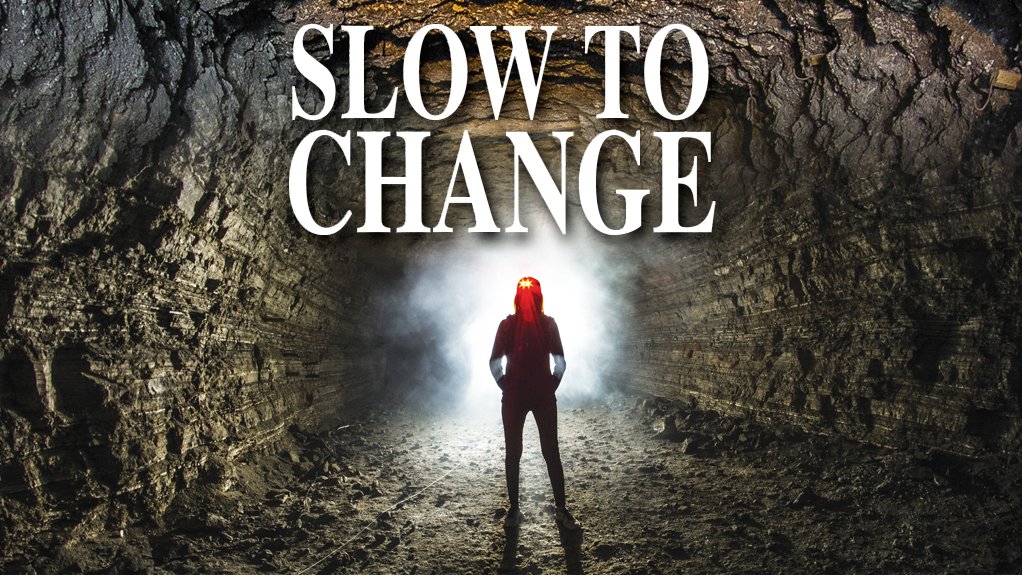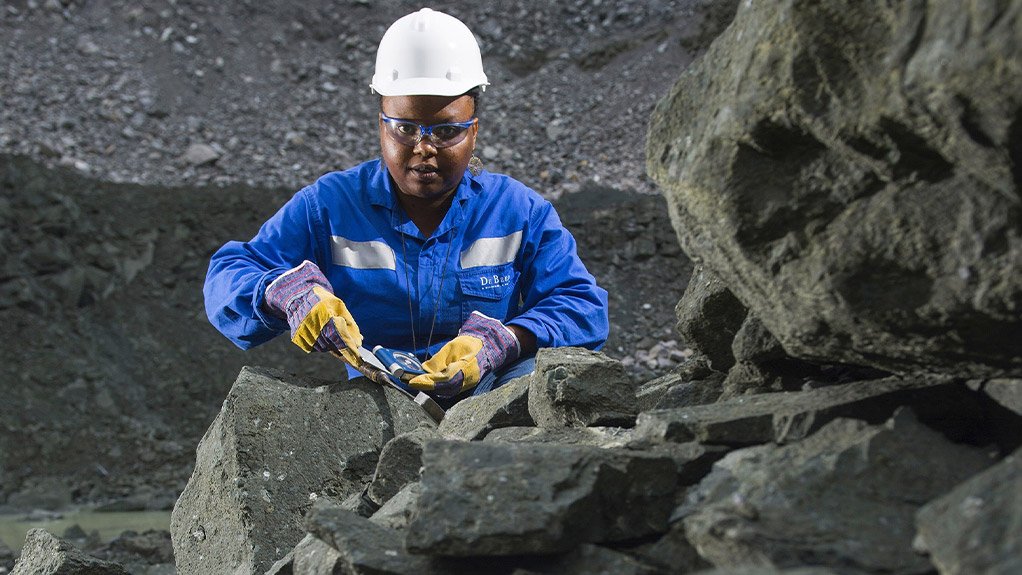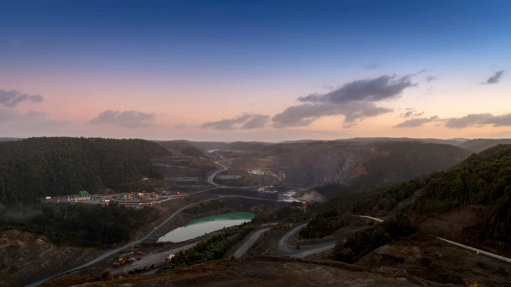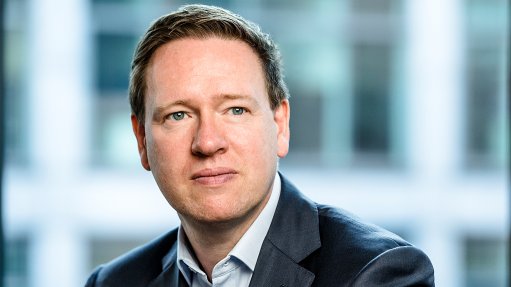Initiatives to boost diversity under way as only 15% of mining jobs are held by women



BUILDING PIPELINE To help promote science, technology, engineering and mathematics skills among female learners, De Beers has launched a three-year partnership with WomEng
The gender gap in the mining industry will widen if it does not invest in attracting more women to associated careers, in view of the quickly evolving roles and skills required by the industry, particularly owing to Industry 4.0, says diamond company De Beers Group.
“There is no doubt that the mining industry will benefit from being more diverse and inclusive, as this leads to greater resilience, agility, innovation and productivity,” emphasises De Beers social impact senior VP Katie Fergusson.
To help promote science, technology, engineering and mathematics (STEM) skills among female learners, De Beers launched a three-year partnership – focused on South Africa, Namibia and Botswana – with South Africa-based nonprofit organisation (NPO) WomEng last month.
This involves running GirlEng workshops every year for more than 800 girls from the communities around De Beers’ mining operations. The day-long workshops aim to make STEM relatable and engaging, as well as increase the girls’ awareness of the various careers available by involving external speakers and mentors.
Sixty of the girls from across the three countries will be brought to Johannesburg in March next year to take part in a two-day technovation challenge aimed at using technology to create a solution that addresses the United Nations’ Sustainable Development Goals.
De Beers also sponsored the WomEng annual fellowship week last month, during which top female engineering students from South Africa, Botswana and Namibia not only focused on a technovation challenge but also received guidance in career, leadership and skills development.
“We are also working with WomEng on how to communicate our employee value proposition to better attract and retain young diverse talent, providing insight for our human resources teams,” says Fergusson.
Meanwhile, despite efforts to make the mining industry more attractive to women globally, the extent of their involvement in the industry has yet to become common knowledge in South Africa, says project, engineering and technical services company Wood civil and structural engineering manager Johanette Pienaar.
“In May, I spent a day with Grade 8 and Grade 10 female learners as part of a job shadow programme and they were surprised to learn what the mining industry entails and the role women play,” she notes.
Therefore, the idea of entering the industry may be intimidating for South Africa’s female learners, compared with other well-known industries, Pienaar says.
Law firm Fasken’s Global Mining Group associate, Mmaphuti Morolong, tells Mining Weekly that she was not exposed to mining at university.
It was only during her articles, which she started at Fasken in 2015, that she was presented with the opportunity to rotate to its mining department. Her curiosity about the industry was driven by her interest to understand the practical side of mining from a legal perspective, owing to the news coverage the industry had received over the years.
Morolong has been a member of Fasken’s Global Mining Group since May 2016.
“There is an increasing number of women involved in mining and other industries in which women were not previously encouraged to pursue careers, owing to the changing views globally on which industries are acceptable for women and the local drive to encourage women empowerment.
“However, with mining generally being a male-dominated industry, there will be challenges for women for a while,” says Morolong, who is also a member of NPO Women in Mining in South Africa (WiMSA).
Law firm Cliffe Dekker Hofmeyr corporate and commercial practice director Mmatiki Aphiri says women continue to face challenges in the mining industry, which include salary disparities, and, particularly for those women working underground, inadequate toilet facilities, ill-fitting safety equipment and constant harassment by their male coworkers, as well as physical limitations, especially when operating machinery specifi- cally designed with men in mind, which can create safety issues for women.
Aphiri points out that the physical limitations of female mineworkers will become less relevant as mining becomes more mechanised, while some initiatives have also been introduced to facilitate women’s parti- cipation in the industry. For instance, the Department of Mineral Resources has since issued guidelines effective December 2015 on the provision of personal protective equipment (PPE) for women in the mining industry in terms of the Mine Health and Safety Act, No 29 of 1996, that make it obligatory to supply female workers with PPE that has been designed specifically for women.
Growing Awareness
One such initiative, the International Women in Resources Mentoring Programme (IWRMP) was formally launched by International Women in Mining at the Investing in African Mining Indaba earlier this year.
Global network of consulting engineers and scientists SRK Consulting has been participating in the programme since October 2018.
SRK’s global board has sponsored five SRK women employees worldwide to be mentored, with Johannesburg-based SRK Consulting environmental consultant Thumo Neluvhalani participating as one of the mentees.
“Participants were partnered with a mentor from a different company and country,” explains Neluvhalani, whose mentor is a senior executive based in Canada.
The main objective of the programme is to empower and promote women working in resources to navigate industry challenges and progress their careers. The current cycle will run to September and participants are also expected to share their acquired knowledge with other women in their organisations.
“It is early days, but SRK’s involvement in the programme has generated interest and enthusiasm among staff and leadership in our South African practice. There is an eagerness to know more about the programme, how Thumo is benefiting, and how others might get involved,” says SRK Consulting South Africa MD Vis Reddy.
SRK’s involvement in the IWRMP is also helping to raise awareness among the men in the organisation, he adds.
SRK Consulting partner and principal environmental scientist Franciska Lake tells Mining Weekly that the company’s in-house leadership development initiative has also been successful in empowering young women in their careers and supporting them in building leadership capacity.
“A strong element of this process is mentoring by the more experienced staff. Therefore, the focus of the IWRMP aligns well with what we are already accomplishing in-house,” she states.
Reddy says the IWRMP has started well and is clearly gaining traction, with SRK expecting to become increasingly involved as the initiative advances.
Women will constitute one-third of SRK’s board next year and occupy leadership roles at national and business unit levels, he says.
In addition, there are six women among SRK’s associate partners – the pipeline to partnership positions – and four full partners in its South African business.
“The presence of women leaders in SRK has enhanced our levels of excellence and added dimension and insight to our multidisciplinary teams,” highlights Reddy.
He says that the world is moving steadily towards more consultative approaches to decision-making, noting that women thrive in this type of environment.
Equality Reality?
Although the number of women in the global mining sector has increased gradually, especially in the engineering and consulting functions, the sector is still male dominated, says Neluvhalani.
Aphiri agrees, noting that there is still much more that women can contribute to the mining industry and that companies need to recognise their contribution.
According to figures released by WiMSA earlier this year, women remain under- represented in the sector, despite comprising more than 51% of South Africa’s total population. Women only hold 15%, or 54 154, of the 453 543 jobs in the local mining industry, according to figures from Minerals Council South Africa, with only 241 women in top management roles and about 800 in senior management positions. In addition, mine ownership figures among women are negligible, says Aphiri.
“The mining sector should be doing better than a mere 15% of the labour force being female. If mining is a driving force in the economy, I’m sure that more women are keen to join the industry,” she stresses.
However, some functions in the mining industry are still being perceived as “men’s work”, says Neluvhalani, adding that this makes it difficult for women to thrive in those areas.
“At executive level, women still face discrimination in decision-making and are often not included in or informed of management issues,” adds Aphiri.
To further improve tolerance towards women working in the mining industry, Neluvhalani says, companies must continue to support women in the industry by constantly striving towards a culture of diversity.
“Programmes such as the IWRMP must continue to ensure that women are encouraged and equipped with the necessary skills to thrive within the industry. This will ensure that more women are included in leadership roles,” she avers.
Pienaar, whose first major mining project involved civil and structural designs for the uranium process plant of the Trekkopje uranium mine, in western Namibia, has, however, rarely experienced serious gender bias and notes that being a woman in a male- dominated industry motivates her to excel.
Currently, she manages a team of civil and structural engineers and designers to deliver “high-quality, value-driven engineered solutions” to Wood’s mining clients.
Pienaar says that the level of acceptance of women is predominantly based on a person’s experience level and competence, rather than gender, adding that it is important to never let “your emotions overpower your intelligence”.
Morolong emphasises the need for women of all ages to assert themselves and occupy their rightful place in the industry, irrespective of the challenges they face.
Balancing the demands of a career and motherhood is a challenge identified by Lake, who notes that, through flexibility and support, companies can help women staff members.
“This has enabled SRK to retain high- quality skills and we do reap the benefits over time,” she says.
However, De Beers notes that male workers with children “have also told us that they would like more flexibility and support to balance parenting with work”.
Reddy acknowledges, however, that it is challenging for a professional in the mining sector to re-enter the industry after having been absent from work for any length of time. Therefore, SRK believes that it is vital to enable its experts to stay in touch with their work, trends and changing technology during such times.
Morolong stresses the need for women and men who have overcome challenges to be mentors and create opportunities and platforms for others to make their mark in the industry.
“Challenges are overcome through exposure and time, and other industry leaders creating the platform for women in the industry, where, slowly but surely, through assertiveness and demonstrating their value, women create awareness in the industry that they are as good as men,” she concludes.
Comments
Press Office
Announcements
What's On
Subscribe to improve your user experience...
Option 1 (equivalent of R125 a month):
Receive a weekly copy of Creamer Media's Engineering News & Mining Weekly magazine
(print copy for those in South Africa and e-magazine for those outside of South Africa)
Receive daily email newsletters
Access to full search results
Access archive of magazine back copies
Access to Projects in Progress
Access to ONE Research Report of your choice in PDF format
Option 2 (equivalent of R375 a month):
All benefits from Option 1
PLUS
Access to Creamer Media's Research Channel Africa for ALL Research Reports, in PDF format, on various industrial and mining sectors
including Electricity; Water; Energy Transition; Hydrogen; Roads, Rail and Ports; Coal; Gold; Platinum; Battery Metals; etc.
Already a subscriber?
Forgotten your password?
Receive weekly copy of Creamer Media's Engineering News & Mining Weekly magazine (print copy for those in South Africa and e-magazine for those outside of South Africa)
➕
Recieve daily email newsletters
➕
Access to full search results
➕
Access archive of magazine back copies
➕
Access to Projects in Progress
➕
Access to ONE Research Report of your choice in PDF format
RESEARCH CHANNEL AFRICA
R4500 (equivalent of R375 a month)
SUBSCRIBEAll benefits from Option 1
➕
Access to Creamer Media's Research Channel Africa for ALL Research Reports on various industrial and mining sectors, in PDF format, including on:
Electricity
➕
Water
➕
Energy Transition
➕
Hydrogen
➕
Roads, Rail and Ports
➕
Coal
➕
Gold
➕
Platinum
➕
Battery Metals
➕
etc.
Receive all benefits from Option 1 or Option 2 delivered to numerous people at your company
➕
Multiple User names and Passwords for simultaneous log-ins
➕
Intranet integration access to all in your organisation




















